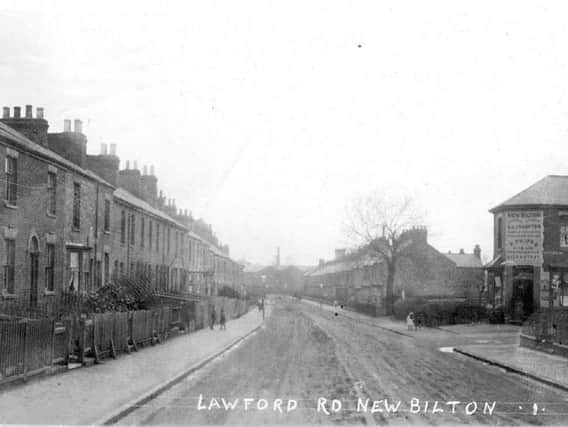Former Advertiser reporter recalls of the magic of a Sunday in 1950s Rugby


The peels of church bells ring across garden, field and hedgerow… while as if not to be outdone, the orange-beaked blackbird perches proudly on the privet, singing his heart out.
The sound of Two-Way Family Favourites creaks and crackles over the airwaves, cutting through the bacon-scented air of the kitchen.
Advertisement
Hide AdAdvertisement
Hide AdSomewhere in the distance, an Austin Seven’s muted put-put can be heard negotiating the twists and turns of the nearby village lane, the diminutive vehicle’s engine also seemingly in competition with the rumble of the little grey Ferguson tractor and trailer now parking up in Jack Mace’s farm over the road.
Those bells are indeed calling out to the faithful. All the same, there are indeed other tasks to be performed in a thousand Rugby households on this 1950s Sunday morning.
Mother will be placing the joint in the oven while father is putting up some bean canes or ‘banking up’ the spuds.
And there will undoubtedly be a few other tasks to be done, for although this may be the Biblical day of rest, the chores don’t magically end on the seventh day. Oh no, they most certainly don’t.
Advertisement
Hide AdAdvertisement
Hide AdBack then, before the advent of political correctness, and its unruly offspring ‘Woke’, there was a type of worker who definitely couldn’t take it easy on a Sunday.
In fact, it was a case of anything but that for this particular category of the labouring classes, which went under the title of ‘housewife’.
In those days, the housewife would be up early preparing that great British institution, the Sunday Lunch. Meanwhile, if Dad wasn’t making up jobs to keep him ‘occupied’, he’d probably be thinking about going down the pub for a few pre-prandial pints and maybe a game of darts with his pals.
But upon his return, there would be no more consumption of alcohol. The wine-with-the-meal habit had yet to arrive at Britain’s shores, and besides, wine was something foreigners drank, definitely a bit dodgy, if not downright effeminate - best just reserved for Christmas or other special occasions such as weddings.
Ah yes, a nice sauterne, that’s lovely.
Advertisement
Hide AdAdvertisement
Hide AdThe growth of tourism during the next decade, and the slow assimilation of ‘foreign ways,’ would irrevocably change this mindset. But in the 1950s, only the well-off could afford to cross the English Channel and explore further afield.
Nevertheless, one form of tourism had increased during this decade and this took the form of the Sunday afternoon drive.
However, the family’s main breadwinner would still have had to earn a fairly high wage to be able to afford a car.
And if this was the case, then a relatively wide, open road beckoned. But those days were definitely numbered as the foundations to Britain’s first motorway – the M1 – were at that very moment being laid just to the east of Rugby and cutting through virgin countryside that had once known only the sound of birdsong.
Advertisement
Hide AdAdvertisement
Hide AdIf you didn’t own a car, all was not lost. The 1950s were the twilight days of the bike ride, when the whole family could saddle up and glide along roads and tree-lined hedges that had yet to be grubbed up by farmers eager to pocket subsidies that would eventually become a veritable cash cow once the country joined the then Common Market.
Many of you will remember how quickly you could head out of Rugby and find yourself in a rural setting. There was once a time, within living memory, when the green fields started just north of the Eleven Arches, carried on through Brownsover, past Cosford and then on to Churchover, the only signs of human habitation being farm buildings and the occasional lone cottage.
Even Bilton, and certainly Dunchurch, still clung on precariously to their rural feel way into the 1950s, despite the fingers of Rugby’s 1930s ribbon development slowly, but relentlessly, reaching out to link up.
The same was true of the Barby and Ashlawn Roads, the latter once boasting verdant hedges which eventually were destined to be trampled under the march of progress.
Advertisement
Hide AdAdvertisement
Hide AdIt’s little wonder that many of us, either in, or approaching our dotage, not only look back with affection and longing, but also a sense of loss for those 1950s days when the world, especially on a Sunday, seemed to be so secure, carefree, and – above all - unchanging.
It’s also very easy to forget just how leisurely was that magical day before the introduction of 24-hour opening, zero hours working, congested roads and round-the-clock television… even if Dad would be keeping well out of the way and pretending there were garden chores to be done.
So above all, let us remember that not everyone could put their feet up. For all the while, 1950s mums everywhere were obliged by tradition to slave away in a hot kitchen, in which the earlier smell of bacon had been usurped by the equally appetising and unmistakable aroma of roast beef and Yorkshire pudding.
John Phillpott’s book Beef Cubes and Burdock: Memories of a 1950s Country Childhood is available from booksellers and can also be ordered online from publishers Austin Macauley.